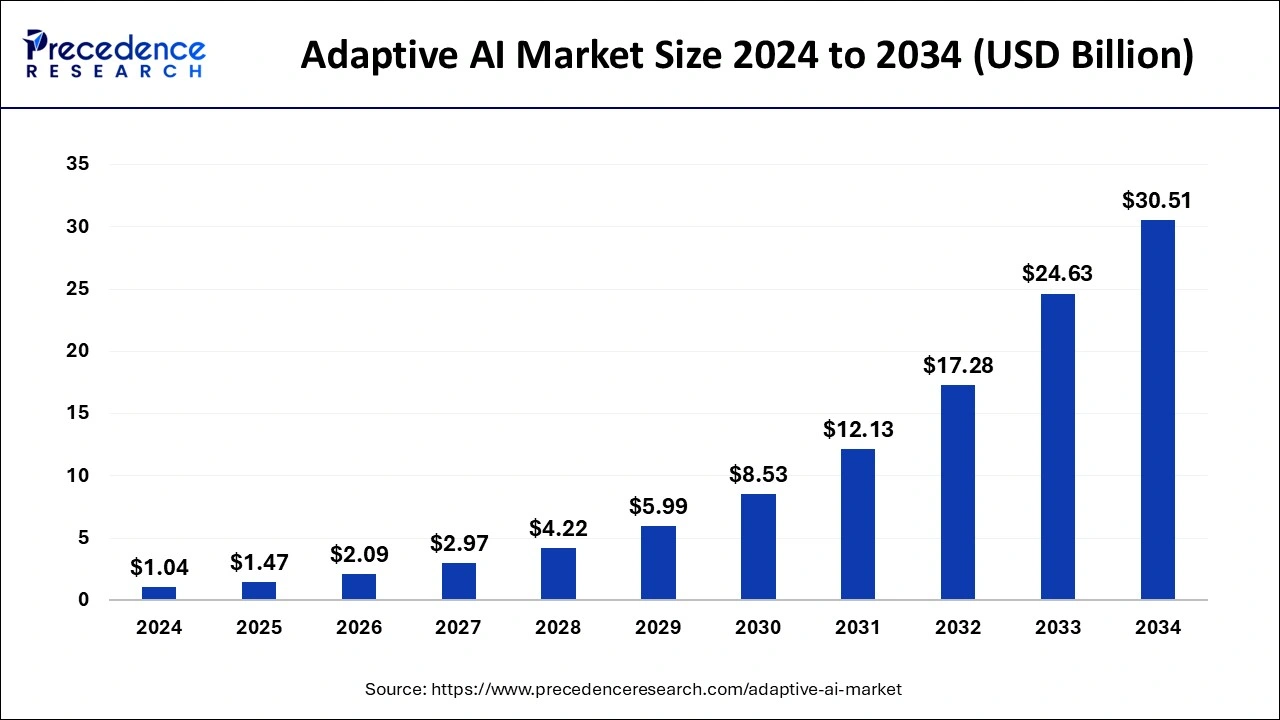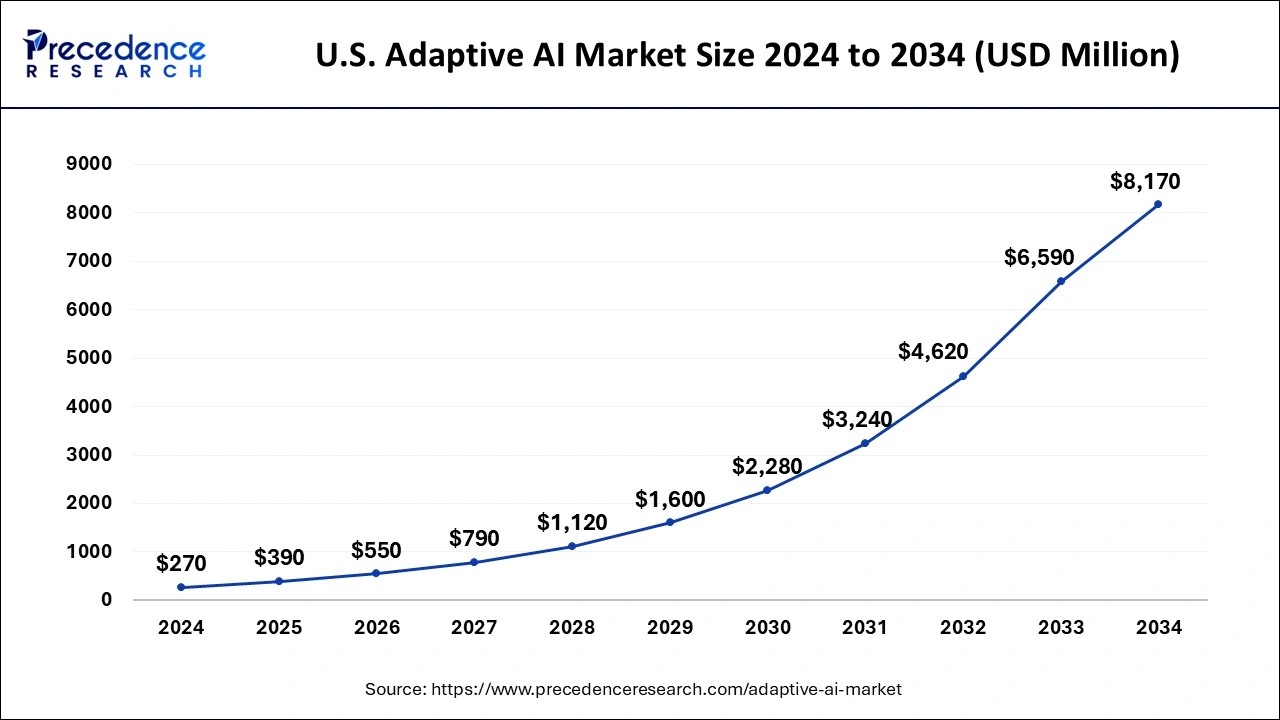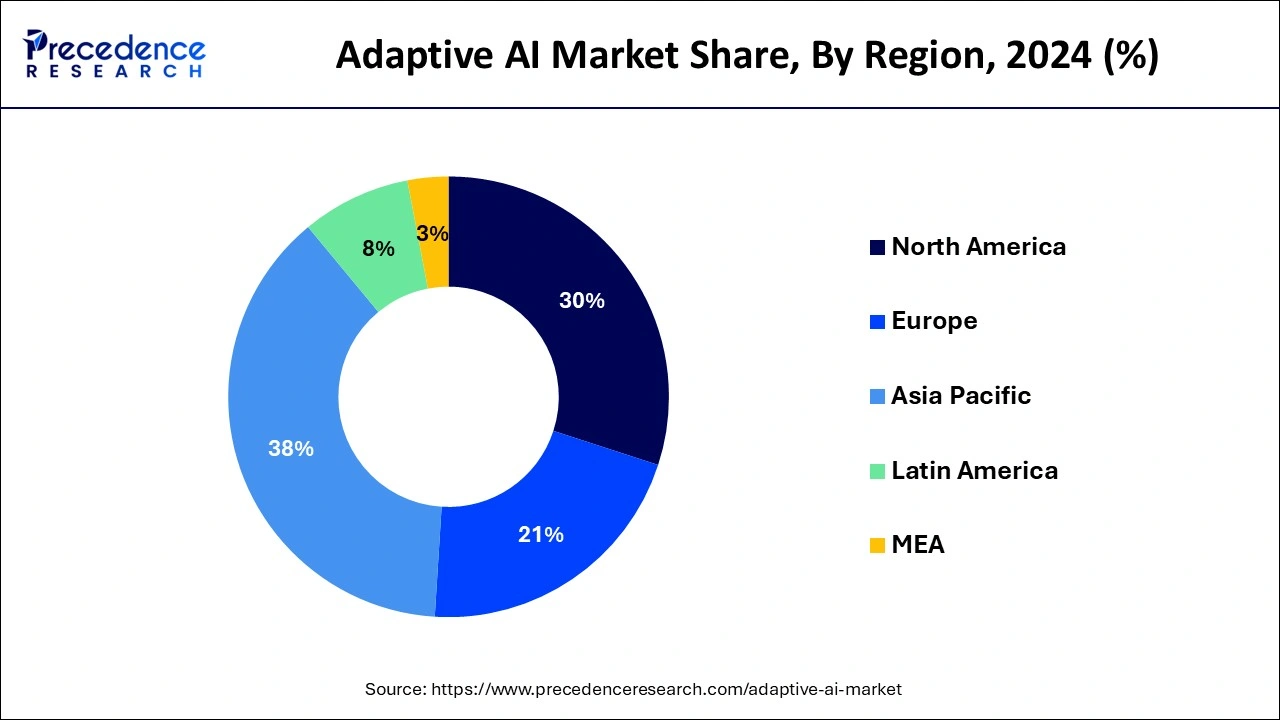The global adaptive AI market size is calculated at USD 1.47 billion in 2025 and is forecasted to reach around USD 30.51 billion by 2034, accelerating at a CAGR of 40.20% from 2025 to 2034. The North America market size surpassed USD 400 million in 2024 and is expanding at a CAGR of 40.22% during the forecast period. The market sizing and forecasts are revenue-based (USD Million/Billion), with 2024 as the base year.
The global adaptive AI market size is accounted for USD 1.04 billion in 2024 and is predicted to increase from USD 1.47 billion in 2025 to approximately USD 30.51 billion by 2034, expanding at a CAGR of 40.20% from 2025 to 2034.

The U.S. adaptive AI market size was exhibited at USD 270 million in 2024 and is projected to be worth around USD 8,170 million by 2034, growing at a CAGR of 40.63% from 2025 to 2034.

North America held a share of 38% in the adaptive AI market in 2024 due to a robust technological landscape, extensive research and development activities, and high adoption rates across various industries.
The region is home to key market players, fostering innovation and driving advancements in adaptive AI applications. Additionally, a mature ecosystem of supportive infrastructure, including cloud computing and data centers, contributes to the region's dominance. The presence of well-established healthcare and financial sectors further propels the adoption of adaptive AI, consolidating North America's major market share.

Asia-Pacific is poised for accelerated growth in the adaptive AI market due to increasing digital transformation initiatives, a rising tech-savvy population, and robust investments in artificial intelligence. Governments and enterprises in the region are increasingly leveraging adaptive AI for diverse applications, ranging from healthcare to finance. The region's dynamic technological landscape, coupled with a growing awareness of the benefits of adaptive AI, positions it as a key growth hub, with significant opportunities for innovation and market expansion.
Meanwhile, Europe is experiencing significant growth in the adaptive AI market due to a convergence of factors. Increased investments in research and development, a robust regulatory framework fostering innovation, and a growing emphasis on integrating advanced technologies in diverse industries are contributing to this surge. Additionally, a heightened awareness of the benefits of adaptive AI, coupled with a collaborative ecosystem between academia and industry, is propelling the region forward. These factors collectively position Europe as a key player in the expanding global adaptive AI market.
Digital utility involves integrating advanced technologies, data analytics, and communication systems into conventional utility infrastructure to improve efficiency, reliability, and sustainability. In the realms of electricity, water, and gas services, adaptive AI solutions leverage smart meters, sensors, and IoT devices for real-time data on consumption patterns and grid performance. This information empowers utilities to optimize resource allocation, swiftly detect faults, and adapt to demand fluctuations.
Moreover, adaptive AI initiatives often integrate predictive analytics and machine learning algorithms for proactive issue forecasting, facilitating preventive maintenance and minimizing downtime. Through this digital transformation, utilities aim to build resilient, responsive, and intelligent infrastructures that meet the evolving needs of modern societies while prioritizing resource conservation and environmental sustainability.
| Report Coverage | Details |
| Growth Rate from 2025 to 2034 | CAGR of 40.20% |
| Market Size in 2025 | USD 1.47 Billion |
| Market Size by 2034 | USD 30.51 Billion |
| Base Year | 2024 |
| Forecast Period | 2025 to 2034 |
| Segments Covered | Component, Application, Technology, and End-use |
| Regions Covered | North America, Europe, Asia-Pacific, Latin America, and Middle East & Africa |
Increasing data volumes
The escalating volumes of data across diverse industries serve as a catalyst, propelling the demand for the adaptive AI market to new heights. As businesses and individuals generate an unprecedented amount of data, adaptive AI systems find themselves in an opportune position to capitalize on this wealth of information. The abundance of data creates a rich tapestry for these systems to learn, adapt, and derive valuable insights.
In sectors ranging from healthcare to finance, the sheer volume of data necessitates intelligent solutions that can navigate and extract meaningful patterns, making adaptive AI a crucial ally in managing and leveraging this data deluge. Moreover, the increasing data volumes contribute to the refinement of adaptive AI algorithms and models.
The continuous influx of data allows these systems to evolve and enhance their decision-making capabilities, addressing the dynamic nature of real-world scenarios. As businesses recognize the transformative potential of harnessing vast datasets, the Adaptive AI market experiences a surge in demand, positioning itself as an indispensable tool for organizations seeking to derive actionable intelligence from the ever-expanding pool of information.
Ethical and bias issues
Ethical and bias issues present significant restraints to the market demand for adaptive AI, undermining trust and hindering widespread adoption. The inherent biases in training data can lead to discriminatory outcomes, perpetuating and even amplifying existing societal biases. This ethical concern not only raises questions about fairness but also poses potential legal and reputational risks for businesses deploying adaptive AI solutions. Stakeholders are increasingly demanding transparency and accountability in AI decision-making processes, pressuring companies to address these ethical challenges to ensure responsible and equitable use.
The awareness of bias issues has heightened scrutiny from regulatory bodies and the public, prompting a cautious approach toward adopting adaptive AI. Concerns about unintentional discrimination, particularly in sensitive areas like hiring, lending, and criminal justice, contribute to hesitancy among potential users. To foster market demand, industry players must prioritize the development of ethical guidelines, invest in unbiased training data, and implement ongoing auditing mechanisms to detect and rectify biases, thereby building a foundation of trust essential for the sustained growth of the adaptive AI market.
Financial services enhancement
Financial services stand at the forefront of opportunities for the adaptive AI market, offering transformative enhancements in various facets of the industry. Adaptive AI plays a pivotal role in optimizing risk management, fraud detection, and customer service within financial institutions. By analyzing vast datasets in real-time, adaptive AI systems can swiftly identify potential risks, adapt to evolving market conditions, and enhance decision-making processes. This not only fortifies the resilience of financial institutions but also contributes to more efficient and accurate financial operations.
Moreover, the integration of adaptive AI enables personalized financial services, tailoring recommendations and solutions to individual customer needs. From dynamic investment strategies to adaptive customer interfaces, adaptive AI fosters a more responsive and customer-centric financial ecosystem. As the financial sector continues to embrace these advancements, the opportunities for adaptive AI to drive innovation, improve operational efficiency, and deliver personalized financial experiences are set to propel the market's growth in the dynamic landscape of financial services.
The platform segment held the highest market share of 53% in 2024. The platform segment in the adaptive AI market refers to the foundational software infrastructure that enables the deployment and functioning of adaptive AI solutions. This includes the development, training, and execution environment for adaptive algorithms. The trend in this segment is characterized by a focus on user-friendly, scalable platforms that facilitate seamless integration of adaptive AI into diverse applications. Key developments include enhanced model interpretability, automated machine learning (AutoML) capabilities, and robust support for real-time data processing, reflecting the industry's commitment to accessibility and efficiency.
The services segment is anticipated to witness rapid growth at a significant CAGR of 43.2% during the projected period. The services segment in the adaptive AI market encompasses the provision of expertise, support, and customization to ensure the effective implementation and operation of adaptive AI solutions. Service offerings include consulting, training, maintenance, and integration services, aiming to optimize the performance and adaptability of adaptive AI systems. Trends indicate a growing demand for specialized consulting services to guide businesses in navigating ethical considerations, mitigating biases, and maximizing the value of adaptive AI, reflecting the market's recognition of the importance of comprehensive and tailored service solutions.
The offline learning and adaptation segment held a 29% market share in 2024. In the adaptive AI market, the offline learning and adaptation segment refers to the capability of AI systems to learn and adapt without requiring a continuous internet connection. This allows the AI to process and adapt to data in offline environments, offering advantages in scenarios with limited connectivity or sensitive data privacy concerns. A notable trend in this segment involves the development of offline learning models that enable devices to autonomously learn from data locally, enhancing privacy, and expanding the applicability of adaptive AI across diverse industries.
The real-time adaptive AI segment is anticipated to witness rapid growth over the projected period. The real-time adaptive AI segment focuses on applications that require instantaneous responsiveness to dynamic data inputs. This subset of the adaptive AI market is characterized by systems that continuously adapt and make decisions in real-time based on changing conditions. Key trends in this segment include the integration of real-time adaptive AI in sectors such as finance for instant fraud detection, healthcare for dynamic patient monitoring, and manufacturing for responsive process optimization. The demand for quick and adaptive decision-making capabilities positions real-time adaptive AI as a critical component in today's fast-paced and data-driven industries.
The deep learning segment has held a 36% market share in 2024. The deep learning segment within the adaptive AI market refers to a subset of machine learning where artificial neural networks, inspired by the human brain, process vast amounts of data to derive complex patterns and insights. This technology enables adaptive AI systems to autonomously learn and adapt to dynamic conditions. Current trends in deep learning for adaptive AI include advancements in neural network architectures, improved model interpretability, and the integration of reinforcement learning techniques, fostering more sophisticated and effective adaptive capabilities across diverse applications.
The machine learning segment is anticipated to witness rapid growth over the projected period. In the adaptive AI market, the machine learning segment involves leveraging algorithms that enable systems to learn and adapt autonomously. These algorithms, inspired by neural networks, empower adaptive AI to dynamically adjust responses based on evolving data patterns. A prominent trend in the machine learning segment is the continuous evolution of deep learning models, enhancing the accuracy and efficiency of adaptive AI applications. Additionally, the integration of reinforcement learning and transfer learning further amplifies the adaptability of machine learning-based adaptive AI, facilitating advancements in diverse domains, from healthcare to finance.
The BFSI segment has held a 22% market share in 2024. In the adaptive AI market, the banking, financial services, and insurance (BFSI) segment encompasses financial institutions deploying adaptive technologies for enhanced decision-making, risk management, and customer engagement. The BFSI sector is witnessing a trend of increased adoption of adaptive AI to optimize fraud detection, personalize financial services, and streamline operational processes. As financial institutions continue to prioritize agility and innovation, adaptive AI becomes integral for staying competitive, addressing dynamic market conditions, and providing tailored solutions to meet the evolving needs of customers in the BFSI domain.
The healthcare & life sciences segment is anticipated to witness rapid growth over the projected period. The healthcare and life sciences segment in the Adaptive AI market refers to the application of adaptive artificial intelligence in medical research, diagnostics, and personalized patient care. This sector harnesses adaptive AI to analyze vast datasets, predict disease trends, and enhance treatment plans. Trends include the integration of adaptive AI in medical imaging for precise diagnostics, drug discovery acceleration through adaptive algorithms, and the development of personalized medicine. The adoption of adaptive AI in healthcare aims to revolutionize patient outcomes by tailoring medical approaches based on individual needs and evolving health conditions.
By Component
By Application
By Technology
By End-use
By Geography
For inquiries regarding discounts, bulk purchases, or customization requests, please contact us at sales@precedenceresearch.com
No cookie-cutter, only authentic analysis – take the 1st step to become a Precedence Research client